- Why this Programme?
- Programme Overview
- Programme Structure and Content
- Career Prospects
- Entry Requirements
Why this Programme?
We’re preparing you for the digital future with a programme that goes beyond traditional business education. You’ll develop:
- Cutting-edge ICT and digital skills
- Cross-sectoral capabilities
- Modern data analysis techniques
- Flexible digital collaboration skills
- Entrepreneurial mindset through a capstone module
What Sets Us Apart
From year one, you’ll build practical IT skills that evolve into sophisticated business intelligence by year three. We’re not just teaching technology – we’re equipping you to thrive in a fast-paced, digital workplace.
- Cutting-edge ICT and digital skills
- Cross-sectoral capabilities
- Modern data analysis techniques
- Flexible digital collaboration skills
- Entrepreneurial mindset through a capstone module
Your Future Starts Here
This programme prepares you for:
- Competitive job markets
- Advanced academic progression
- Active citizenship in a digital world
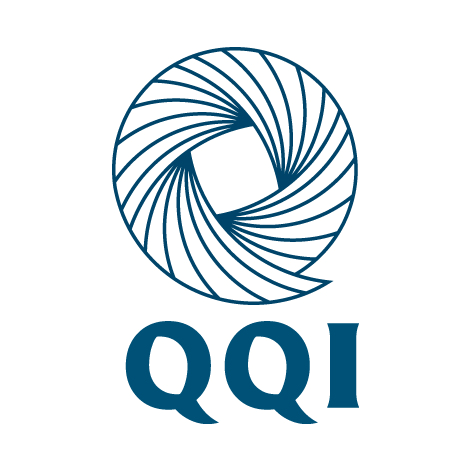
Programme Overview
The Bachelor in Business is designed for domestic and international students, including school leavers, mature learners and those entering at stages 2 or 3 through Recognition of Prior Learning (RPL). The programme provides a comprehensive and modern business education, covering management, finance, human resources, marketing, law, ICT, mathematics, statistics, and economics.
Informed by research and feedback from employers and stakeholders, this degree equips students with the skills needed for success in today’s business world.
On Completion, You Will Be Able To:
- Apply specialised knowledge in key business areas, including management, finance, marketing, ICT, and economics
- Critically assess theories and frameworks in business, identifying knowledge gaps and integrating concepts across disciplines
- Solve business problems creatively using software tools and effectively present results
- Design and implement solutions to business challenges, from structured to complex problems
- Analyse and solve business problems within their specific context, using appropriate data and knowledge
- Work collaboratively in diverse teams, take leadership roles, and develop as a self-aware, independent learner
- Reflect on the business world’s social, legal, ethical, and operational aspects, considering all relevant stakeholders

Programme Structure and Content
The three-year full-time Bachelor’s programme consists of two semesters per academic year (24 teaching weeks). In Years 1 and 2, students complete 10 ECTS modules, with 50% assessed by coursework and 50% by a mix of coursework and exams.
In Year 3, the Innovation & Entrepreneurship capstone module challenges students to apply their knowledge by creating a Business Model Canvas and analysing entrepreneurial traits.
Stage 1 Modules
- IT Fundamentals & Skills
- Principles of Business & Management
- HRM and the Inter-Cultural Workplace
- Marketing Fundamentals & Applications
- Introduction to Accounting
- Business Mathematics
- Academic Skills Development
- View Full Description
Stage 2 Modules
- Operations & Supply Chain Management
- Cost & Management Accounting
- Consumer Behaviour
- Business Information Systems
- Statistics for Business
- Economics for Business
- Market Research
- Principles of Law
- Technology Innovation
- Effective Communications for Business
Award Stage Modules
- International Business
- Financial Management
- Talent Resourcing & Development
- Integrated marketing Communications & Advertising
- Employment and Company Law
- Business & Personal Ethics
- Applied Project Management
- Employee Relations
- Digital Marketing
- Business Intelligence
- Innovation & Entrepreneurship
Access, Transfer & Progression
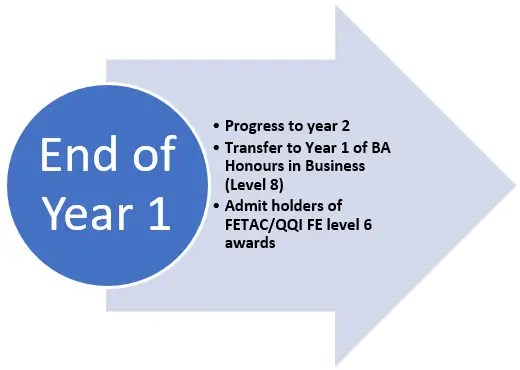
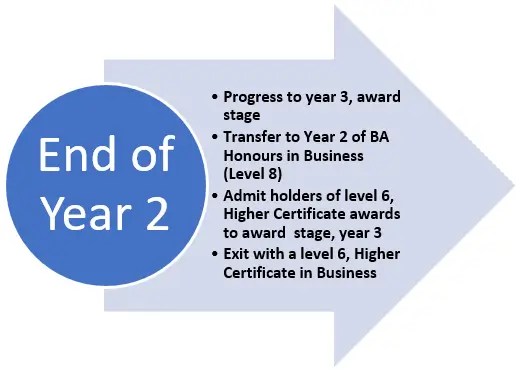
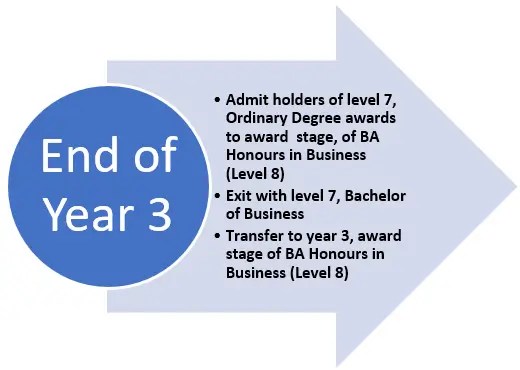
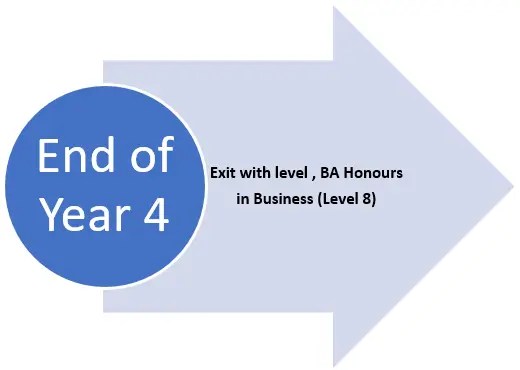
What Does a Level 7 and Level 8 Degree Mean?
Level 7 and Level 8 degrees differ in expertise, skills, and entry requirements, with Level 8 demanding more advanced knowledge and decision-making.
| NFQ LEVEL | LEVEL 7 | LEVEL 8 |
|---|---|---|
| Applicable Programmes | Bachelor of Business | Bachelor of Arts (Honours) in Business5 |
| Knowledge and Understanding | have demonstrated basic knowledge and understanding, underpinned by the basic theories, concepts or methods of the field of study, that builds upon secondary education and which is typically at a level supported by introductory third-level textbooks | have demonstrated specialized knowledge and understanding, underpinned by the more advanced theories, concepts or methods of the field of study, have begun to show some awareness of the limitations of current knowledge and the sources of new knowledge, and which is typically supported by intermediate and advanced textbooks |
| Applying Knowledge and Understanding | can apply their knowledge and understanding in specific educational and occupational contexts related to the field of study as well as general educational, occupational and social contexts | begins to apply their knowledge and understanding to devise, develop and sustain arguments within the field of study |
| Making Judgments | have the ability to identify and use data to formulate responses to well-defined concrete and abstract problems within the field of study and to judge the validity of conclusions against their knowledge, understanding, and the available data. | have the ability to identify and use data to formulate responses to well-defined concrete and abstract problems within the field of study, and have begun to develop the ability to identify gaps or discrepancies in the data and strategies to eliminate or compensate for these |
| Communications and Working Skills | can communicate about their understanding, skills and activities, with peers and supervisors | can communicate about their understanding, skills and activities, with peers, supervisors and client |
| Learning Skills | have the learning skills to undertake further studies with some autonomy. | have the learning skills to undertake further studies with some autonomy. |
Career Prospects
This programme focuses on developing digital and transferrable skills to enhance graduate employability and adaptability. Graduates will gain self-confidence, communication skills, and the ability to thrive in diverse work environments, preparing them for business support or junior management roles.
Potential Career Roles:
- HR Generalist
- Business Support
- Business Administration
- Sales Support
- Marketing Assistant
- Business Analyst
- Business Development Officer
- Entrepreneur
- Financial Support Officer
- Accounting Support Officer
Graduates can also pursue a one-year Honours Bachelor’s degree, such as the BA (Hons) in Business at IBAT.

Entry Requirements
Academic Qualifications:
- Leaving Certificate: Grade O6/H7 or better in 5 subjects, including English and Mathematics
OR - Overseas Qualifications: Must align with a level-7 Business award in the QQI standard. IBAT College Dublin uses the NARIC system for qualification comparison
- Mature Applicants:
- Must be at least 23 years old by 1st January of the year of admission
- No standard academic entry required, but applicants must provide evidence of prior learning, work experience, motivation, and commitment (CV, personal statement, work references, and any relevant training courses)
- Recognition of Prior Learning (RPL):
- Applicants with relevant prior learning may enter directly into Stage 2 or the Award Stage.
English Language Requirements:
- Native English speakers: No further proof required
- Non-native speakers: IELTS Academic score of 6.0 (no band below 5.5) or equivalent
- Alternative: Duolingo English Test with a minimum score of 105 (equivalent to IELTS 6.0)
- Other Qualifications: If you completed your final education in English, consult with the Admissions Team for validation awards.
For further details, please contact our Admissions Team.
Why Study in Dublin?
- Average starting salary of €33,000* (achieved by 90% of graduates)
- Dublin hosts major global companies like Google, Facebook, Accenture, and Salesforce
- Dublin’s high employment rates and thriving tech scene provide excellent job prospects
- A 12-month post-graduation work permit offers graduates the chance to gain experience with leading companies or start-ups
- Central campus with modern facilities, ideally located for work and leisure

Why Study at IBAT Dublin?
We are Ireland’s leading enterprise-focused third level institution with a special focus on how we guide, support, and mentor our students throughout their college experience and into their working lives.
We know that employers need graduates that can hit the ground running, so we’ve tailored our courses to prepare you to do just that. And if you need an extra hand, our Academic team equipped with years of lecturing and industry experience are ready to support you both in your professional and personal development.
Diverse Programmes
Take your pick of our wide range of courses, each designed with your future in mind.
Expert Tutors
Learn from industry professionals at the very top of their game.
Flexible Learning
Life happens. We get it. Study and achieve your goals on your schedule.
Central Location
Study at one of our two campuses placed in the heart of central Dublin.
Small Class Sizes
Get one-to-one, personalised support from our tutors.

Student Testimonial
Meet Jaden Hanson-White, a Student in the Bachelor of Business Programme.
Listen as Jaden shares why she chose to study at IBAT, highlighting its great location and strong international reputation.








